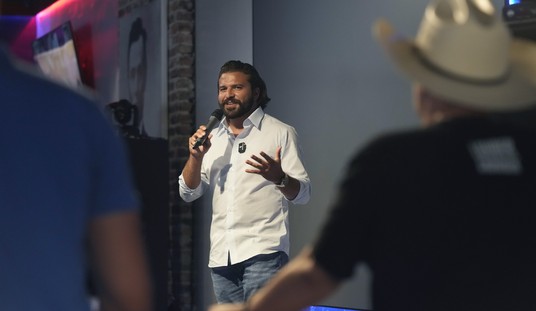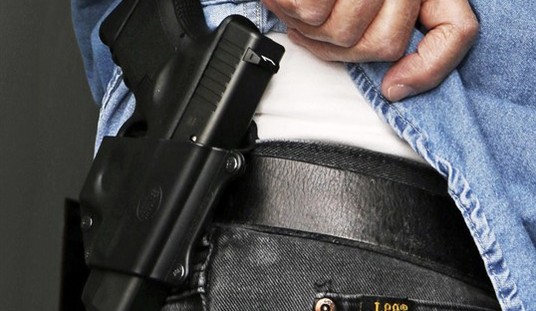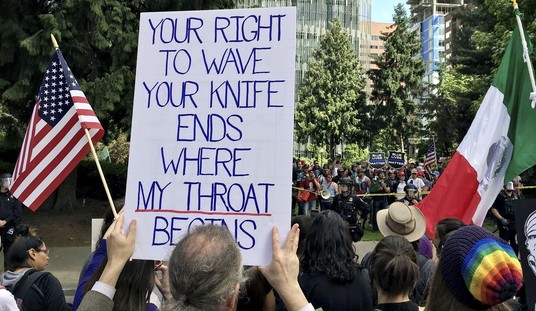I’ve not covered the silly theatrics of self-absorbed professional athletes “protesting” the national anthem here at Bearing Arms for one very simple reason: it isn’t a Second Amendment issue. Protesting the flag, the National Anthem, etc is a matter of free speech, and simply isn’t in my lane as an editor focused on the issues regarding the right to bear arms.
However, Denver Broncos linebacker Brandon Marshall has piqued my attention with an op-ed he wrote for the Denver Post yesterday and I’m compelled, and ever so happy, to address an issue it has inadvertently unveiled.
In his op-ed, Marshall was attempting to explain why he had taken a knee in protest during last Thursday night’s game, citing an incident in which he was allegedly abused by law enforcement officers following a shooting.
But even before I took a knee, I knew it would just be the beginning. The knee was just to bring awareness. It’s a symbol. What’s the point of protesting without any action? We’ve started a conversation now, and as much as anyone wants to believe there’s equality and that there is no discrimination in this country, there is. We may not be able to stop it entirely, but we can bring awareness and begin to correct the injustices, be it sexism, ageism, racism — all of it.
So shortly after I took a knee, I started talking to people to figure what I can do and how I can do it.
There has been a lot of negativity, and I expected that, but I try to not read into it too much. A lot of the backlash is a diversion from the real issue, something I was reminded of firsthand this summer.
I was in Miami with three others at a restaurant and there was a shooting. Everybody ducked under the table out of fear, and a cop came in and told us it was fine, that it was just fireworks. We knew that wasn’t the truth.
We began to leave the only way we knew, but there was a lady in regular street clothes directing traffic, telling us, “Go this way, go this way!” At a serious, scary moment a lady I didn’t know was telling me which way to go, and I didn’t trust it.
We went our own way, and she yelled to the cops, “Stop him! Get him!” When I turned around, about five officers rushed toward me to take me down. They tried to take me down up top, then they tried to grab my legs. One of the cops pointed a Taser at my chest. They handcuffed me and I heard one say, “Take him in for resisting.”
I was in the back of the police car headed to the station when one of the officers radioes [sic] in and said, “Bring him back.” They told me, “Look, we’re not going to take you in as long as you keep this between us.”
Oh, dear.
He’s really going there?
Well, that’s fine, but now I feel compelled to comment.

Mr. Marshall’s story, in which five law enforcement officers allegedly took him into custody for no discernable reason and then unceremoniously him off as part of a cover-up, should have been front page news at the time it happened.
As described, we’re talking about a criminal conspiracy by law enforcement officers who battered a professional athlete in front of his entourage and who knows how many dozens of witnesses fleeing a restaurant after a shooting.
Even if Marshall himself didn’t bring the story to the light of the public, certainly other restaurant patrons or the other three members of his dinner party would have said something to someone about this flagrant abuse of power by law enforcement.
Well, that is, if it happened, of course.
And that’s where we start to have some problems, don’t we?

Marshall’s account of his ‘traumatic incident’ is precisely the kind of story we would expect to hear from someone looking to fabricate an account, but who lacks the knowledge of law enforcement techniques, tactics, and procedures (TTPs). Like “stolen valor” claims made by those who have never been in combat telling stories of being a military hero, Marshall’s account of being a victim of police violence after a shooting stinks to high heaven to anyone with any rudimentary knowledge of how law enforcement actually operates.
In an effort to build credibility with anti-police protesters, it appears that Mr. Marshall has created a fantasy, however, his lack of knowledge of the situation he’s trying to peddle to the country fails to convince this editor.
Lie detecting is a skill every good journalist, police officer, and parent should develop, and so I’m surprised that the Denver Post editors who read Marshall’s op-ed before publication didn’t stop on a dime, call him up and ask, “Are you really sure you want to do this?”
Sadly, I suspect they were more wrapped up in the opportunity to participate in the latest “social justice” craze than performing a brief investigation into an obviously suspect account that blatantly fictitious, at best.
Let’s unpack this together, shall we?
There has been a lot of negativity, and I expected that, but I try to not read into it too much. A lot of the backlash is a diversion from the real issue, something I was reminded of firsthand this summer.
I was in Miami with three others at a restaurant and there was a shooting. Everybody ducked under the table out of fear, and a cop came in and told us it was fine, that it was just fireworks. We knew that wasn’t the truth.
Both truth-tellers and skilled fantasists provide the kind of details an average person would expect to recall from a real life incident. The date of the incident, the names of who you were with, the location of the incident, and the name of the place. All of those elements are missing here – precisely what you expect from someone intentionally trying to withhold such information lest facts be checked. But this is a huge red flag for journalists who’ve spent a career determining whether they’re talking to a real witness to a crime, or a grandstanding nut job looking to get their name in the paper.
I guess that skepticism a journalist is required to have goes out the window when the witness in question is a hometown football hero riding high on a social justice crusade.
We began to leave the only way we knew, but there was a lady in regular street clothes directing traffic, telling us, “Go this way, go this way!” At a serious, scary moment a lady I didn’t know was telling me which way to go, and I didn’t trust it.
We went our own way, and she yelled to the cops, “Stop him! Get him!” When I turned around, about five officers rushed toward me to take me down. They tried to take me down up top, then they tried to grab my legs. One of the cops pointed a Taser at my chest. They handcuffed me and I heard one say, “Take him in for resisting.”
Mr. Marshall’s story, already highly suspect for the lack of specificity that is the mark of a real story (or at least a good fake one), goes completely off the rails when he asserts that police officers randomly gang tackle people on a whim (of course, being the hero of fantasy, the five cops only “tried” to tackle him).
Here in the real world, we know that officers are required to follow TTPs, or tactics, techniques, and procedures. Officers nationwide have tens of millions of contacts with the general public every year, and all of those interactions are much more choreographed than a self-absorbed athlete like Marshall would ever know. If they didn’t follow these TTPs, waves of excessive force civil suits would drive most cities into bankruptcy in short order, and turn many officers into criminals with assault convictions.
But how would Mr. Marshall know that? He’s just a sportsball player. Concocting a good story isn’t part of his normal job.
I was in the back of the police car headed to the station when one of the officers radioes [sic] in and said, “Bring him back.” They told me, “Look, we’re not going to take you in as long as you keep this between us.”
As if fabricating a tale of criminal assault at the hands of almost a half dozen officers wasn’t enough, Marshall then has to find a way to back out of it… after all, he wasn’t arrested or charged with resisting arrest, and even his tiny, reptilian linebacker mind can ascertain the need to explain the glaring lack of a paper trail and the requisite flood of media attention that results every time a professional athlete gets arrested.
Unfortunately, alleging a police conspiracy to cover up why he wasn’t taken downtown and booked doesn’t help him either.
What Mr. Marshall apparently isn’t bright enough to know is that his personal information would have been collected by the police at the moment of his alleged arrest, and therefore would provide a record of his interaction with said law enforcement, even if they magically let him go before he was booked.
Oops.
Mr. Marshall neglected to mention which law enforcement agency’s officers in Miami allegedly abused him, so I covered my bases and contacted Miami-Dade Police Department, which fills a role similar to that of a sheriff’s department in other jurisdictions, the Miami Police Department, and, because Miami Beach is so popular with celebrities and athletes, the Miami Beach Police Department as well.
Curiously, none of those agencies had any record of contact with Brandon Markeith Marshall (date of birth: September 10, 1989; place of birth: Las Vegas, Nevada) throughout the summer of 2016 when he alleges the incident took place.
It’s almost like a spoiled athlete was offered a chance to explain himself in a newspaper op-ed for a stance that he took without really thinking about it, and then decided he had to fabricate a backstory to make it appear that his actions were more noble than they actually are.
Thankfully, that would never happen in the real world, and we have eagle-eyed fact checkers in news outlets like the Denver Post who would never fall for such an obvious scam.







Join the conversation as a VIP Member